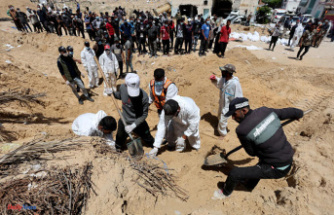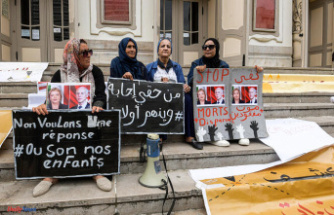The children's book author Otfried Preussler, who was still popular years after his death, was taken prisoner of war by the Soviets as a Wehrmacht soldier. The literary scholar Carsten Gansel has researched how the creator of "Krabat" processed his dramatic experiences in writing.
Carsten Gansel is a passionate scientist, a digger who doesn't sit in an ivory tower but prefers to rummage through mountains of documents in desolate rooms. He used the few years in which Russia kept its - once - top secret archives open for research. We have him to thank for rediscovering the original version of Heinrich Gerlach's great Stalingrad novel in Moscow. Most recently, Gansel dealt with Otfried Preußler, one of the most important children's and youth book authors in Germany after 1945.
Again Gansel viewed Russian military and secret service documents - fortunately he was ready in time. "The last research was done in 2020. Such archive work is certainly no longer possible at the moment," he says to ntv.de in view of the ice age between Moscow and the West as a result of the Russian attack on Ukraine. The scientist published the results of his efforts in a book "Child of a Difficult Time: Otfried Preussler's Early Years". In it, Gansel traces how the world-famous author processed the trauma of his war experiences over decades in writing.
The professor of German literature at the University of Giessen goes into particular detail about the writing of "Krabat". The journeyman miller's story is one about power, how it can be misused to lure young people, but also how one can free oneself from it, thereby saving and redeeming others. Krabat falls for the evil magician and his black magic and eludes him again.
Preussler followed Hitler's call, also a nasty seducer, although he was not a fervent Nazi, enthusiastically volunteered for military service and, as a very young officer, was taken prisoner in 1944 after two years on the Eastern Front. Like Krabat, the writer experienced how close companions suddenly disappeared forever, and often looked death itself in the eye: "I still resembled Mahatma Ghandi in my drought," he later described his physical condition during the five-year imprisonment in the camps from Yelabuga and Kazan.
The parallels between fictitious (Krabat) and real experience (Preussler) are no coincidence. The literary character and her creator are both survivors of a dark episode in their lives. Preußler, who also invented "Räuber Hotzenplotz" and "The Little Witch", contrasted the nearness to death, fear and hunger on the one hand with the "experience of hope and solidarity, of human encounters" on the other - that also fits the story of Krabat.
The thesis that the author addressed his war history in "Krabat" has been discussed for a long time. It is to Gansel's merit that he scientifically substantiated it by meticulously examining Preussler's "young years" and linking them to psychological findings. Apparently, Preussler's subconscious played an important role when he first started thinking about the work in the late 1950s, but also when it took him significantly longer than planned. The first edition appeared in 1971.
Gansel consequently comes to the conclusion that "Krabat" must be a form of trauma coping. While many other important writers wrote down their tragic experiences at the front - Heinrich Gerlach is one of them - or in concentration camps in autobiographical novels, Preussler chose allegory as a medium.
At least first. In the mid-1980s, Preussler, who died in 2013 at the age of 89, set about writing a biographical novel in which the main character, an officer named Trenkler, is recognizable as his alter ego: a WWII Wehrmacht lieutenant in the southern part of the Eastern Front in today's Ukraine and Moldova, who has to deal with "the Ivan" and is taken prisoner. It bore the working title "Bessarabian Summer" and has remained a fragment. Preußler broke off the novel because, by his own admission, he preferred not to "hide behind the mask of a literary fictional character".
Instead, he decided to write a first-person autobiography, "Lost Years?" should be called. The question mark indicates that Preussler had doubts that he had done everything right until shortly before the end of his life. He also left the work unfinished, although the then editor of the FAZ, Frank Schirrmacher, who died in 2014, was one of the first readers to express his enthusiasm. Gansel explains the demolition: "The past, including the traumatic, has been processed." Preussler came to the conclusion: "These were not wasted years at all. On the contrary."
Excerpts from the novel fragment and the unfinished autobiography are published for the first time in Gansel's book. They are part of the search for an answer to the question of how memories can flow into a writer's work, enrich it - or bring it down. Anyone who wants to find out exactly what this is about is in good hands with Gansel, even if one or the other will ask themselves in view of the abundance of detail whether 560 pages were required to tell just the "early years" of Preussler. One suspects that the editor would have liked it to be a little shorter.
Either way, it's worth reading: the book has gained an unexpected topicality as a result of Putin's war against Ukraine. It ends with Preußler's wish, which he recorded in his later years: "I hope from the bottom of my heart that the powerful of this world will finally succeed in bringing about the peace that our peoples have long since made with each other after the bitter experiences of the last war to have." Earth is a long way from that. Science is already feeling the consequences. In any case, Gansel has no hope of diving back into Russian archives to dig up more rarities. He says, "I think that was it."












